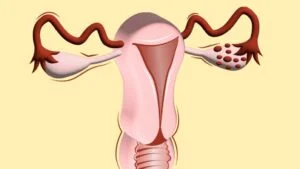Polycystic Ovary Syndrome (PCOS) is a common hormonal disorder affecting individuals of reproductive age, often causing irregular periods and difficulties in conceiving. For those with PCOS aspiring for a pregnancy, a holistic approach that includes home remedies and lifestyle changes can play a crucial role in improving fertility and supporting a healthy pregnancy.
In this blog, we will explore various PCOS home remedies and lifestyle modifications tailored to enhance the chances of conception.
Contents
Understanding PCOS and Its Impact on Pregnancy

While PCOS poses various challenges to reproductive health, it is essential to comprehend its impact on pregnancy for those navigating fertility concerns.
1. Irregular Menstrual Cycles:
One of the hallmark features of PCOS is irregular menstrual cycles. Instead of the typical 28-day cycle, individuals with PCOS may experience infrequent or absent periods. Irregular ovulation can complicate the conception process, making it more challenging for those with PCOS to predict fertile windows accurately.
2. Anovulation and Infertility:
PCOS is often associated with anovulation, the absence of ovulation, or irregular ovulation patterns. This irregularity can lead to difficulties in achieving pregnancy, as ovulation is a crucial factor in the conception process. Women with PCOS may have fewer opportunities for fertilization due to the unpredictable release of eggs from the ovaries.
3. Insulin Resistance:
Insulin resistance is another common feature of PCOS. The body’s cells become less responsive to insulin, leading to elevated insulin levels in the blood. Insulin resistance is not only linked to metabolic issues but can also impact ovarian function. Elevated insulin levels stimulate the ovaries to produce more androgens, further contributing to hormonal imbalances and irregular ovulation.
4. Increased Risk of Gestational Diabetes:
Women with PCOS are at an increased risk of developing gestational diabetes during pregnancy. The insulin resistance that characterizes PCOS can persist during pregnancy, affecting glucose metabolism. Proper management and monitoring of blood sugar levels become crucial to mitigate the risks associated with gestational diabetes.
5. Higher Risk of Pregnancy Complications:
PCOS has been associated with a higher risk of certain pregnancy complications, such as preeclampsia, preterm birth, and cesarean section. The hormonal imbalances and metabolic disturbances associated with PCOS can contribute to these complications, underscoring the importance of careful monitoring and proactive healthcare during pregnancy.
Home Remedies for PCOS Pregnancy
Polycystic Ovary Syndrome (PCOS) can present challenges for some women trying to conceive, but there are various home remedies and lifestyle changes that may help support a healthy pregnancy. It’s important to note that while these strategies may be beneficial for some, consulting with a healthcare professional is crucial for personalized advice and guidance. Here are some general suggestions:
Balanced Diet

Maintaining a balanced diet is crucial for managing PCOS and supporting a healthy pregnancy. A balanced diet can help regulate insulin levels, manage weight, and improve overall well-being. Here are some dietary recommendations as home remedies for PCOS and pregnancy:
- Focus on Whole Foods: Emphasize whole, nutrient-dense foods such as fruits, vegetables, whole grains, lean proteins, and healthy fats. These foods provide essential vitamins, minerals, and fiber.
- Protein-Rich Foods: Include lean sources of protein in your diet, such as poultry, fish, tofu, legumes, and nuts. Protein helps stabilize blood sugar levels and promotes satiety.
- Healthy Fats: Include sources of healthy fats, such as avocados, nuts, seeds, and olive oil. These fats are important for hormone production and overall health.
- Fiber-Rich Foods: High-fiber foods can help regulate blood sugar and improve digestion. Include plenty of vegetables, fruits, whole grains, and legumes in your diet.
Low-GI Foods
A low-glycemic index (GI) diet can be beneficial for women with PCOS (Polycystic Ovary Syndrome) as it may help manage insulin resistance and support overall health, including during pregnancy. Here are some low-GI foods that you can include in your diet:
- Whole Grains: Opt for whole grains such as quinoa, brown rice, barley, bulgur, and oats. These grains have a lower glycemic index compared to refined grains.
- Legumes: Beans, lentils, and chickpeas are excellent sources of protein and fiber with a low glycemic index. They help stabilize blood sugar levels and promote satiety.
- Non-Starchy Vegetables: Load up on non-starchy vegetables like leafy greens, broccoli, cauliflower, bell peppers, and tomatoes. These vegetables are rich in fiber and nutrients and have a low impact on blood sugar.
- Berries: Berries such as blueberries, strawberries, raspberries, and blackberries are low in sugar and high in fiber, making them a great choice for a low-GI diet.
- Nuts and Seeds: Almonds, walnuts, chia seeds, and flaxseeds are rich in healthy fats, protein, and fiber, providing a low-GI snack option.
Spearmint Tea
Spearmint tea is often suggested as a natural remedy for PCOS (Polycystic Ovary Syndrome) due to its potential to help manage certain symptoms associated with the condition. However, it’s important to note that scientific evidence supporting its efficacy in improving fertility or supporting pregnancy in women with PCOS is limited. The potential benefits are primarily linked to hormonal regulation, particularly in reducing androgen levels.
Here are some considerations regarding spearmint tea for PCOS:
- Androgen Reduction: Some studies suggest that spearmint tea may help lower androgen levels in women with PCOS. Elevated androgen levels are associated with symptoms such as hirsutism (excess hair growth) and acne.
- Menstrual Cycle Regulation: Some women with PCOS may experience improved menstrual cycle regularity when incorporating spearmint tea into their routine.
- Anti-Inflammatory Properties: Spearmint tea is known for its anti-inflammatory properties, which may have a positive impact on inflammatory factors associated with PCOS.
- Insulin Sensitivity: There is limited evidence to suggest that spearmint tea might have a positive effect on insulin sensitivity, which is often impaired in women with PCOS.
Cinnamon’s Role
Cinnamon is a popular spice that has been studied for its potential health benefits, including its role in managing symptoms associated with PCOS (Polycystic Ovary Syndrome). While research is ongoing, some studies suggest that cinnamon may have positive effects on insulin sensitivity, which is particularly relevant for women with PCOS who often experience insulin resistance. Here’s how cinnamon may play a role in managing PCOS and supporting pregnancy:
- Improved Insulin Sensitivity: Insulin resistance is a common feature of PCOS and can contribute to hormonal imbalances. Some studies suggest that cinnamon may help improve insulin sensitivity, potentially leading to better blood sugar control.
- Regulation of Menstrual Cycles: PCOS is often associated with irregular menstrual cycles due to hormonal imbalances. Improved insulin sensitivity may contribute to better regulation of menstrual cycles in some women with PCOS.
- Lowering Blood Sugar Levels: Cinnamon has been studied for its ability to lower blood sugar levels, which can be beneficial for individuals with insulin resistance or diabetes. Stable blood sugar levels are important for overall health and may positively impact fertility.
Yoga and Deep Breathing

Yoga and deep breathing exercises can be beneficial for women with PCOS (Polycystic Ovary Syndrome) during pregnancy. These practices may help manage stress, improve overall well-being, and potentially address some of the symptoms associated with PCOS. Here’s how yoga and deep breathing can be considered home remedies for PCOS and pregnancy:
- Stress Reduction: Yoga often incorporates mindfulness and relaxation techniques, which can help reduce stress levels. Chronic stress can contribute to hormonal imbalances, so managing stress is important for women with PCOS.
- Hormonal Balance: Some studies suggest that yoga may have a positive impact on hormonal balance, including the regulation of insulin and cortisol levels. This can be particularly relevant for women with PCOS who often experience insulin resistance.
- Improved Sleep: Regular practice of yoga and deep breathing exercises can contribute to better sleep quality. Adequate and restful sleep is crucial for overall health and hormonal regulation.
Inositol
Inositol, particularly a specific form called myo-inositol, has gained attention for its potential benefits in managing PCOS (Polycystic Ovary Syndrome) and improving fertility, including during pregnancy. It is a naturally occurring compound found in foods and is also produced by the body. Some studies suggest that inositol supplementation may have positive effects on insulin sensitivity, ovarian function, and reproductive outcomes in women with PCOS. Here’s how inositol may be considered a home remedy for PCOS and pregnancy:
- Improving Insulin Sensitivity: Inositol, particularly myo-inositol, has been shown to improve insulin sensitivity, which is often impaired in individuals with PCOS. By addressing insulin resistance, inositol may help regulate menstrual cycles and improve fertility.
- Ovulatory Function: Inositol supplementation may contribute to the restoration of normal ovulatory function. This is important for women with PCOS who may experience irregular or absent menstrual cycles.
Hydration

Hydration is a fundamental aspect of overall health, and it can play a supportive role in managing PCOS (Polycystic Ovary Syndrome) and promoting a healthy pregnancy. Staying well-hydrated is important for various physiological functions and may have specific benefits for women with PCOS during pregnancy. Here’s why hydration can be considered a home remedy for PCOS and pregnancy:
- Metabolic Health: Hydration is essential for maintaining optimal metabolic health. Drinking enough water can support various metabolic processes in the body, which is crucial for overall well-being.
- Detoxification: Proper hydration supports the body’s natural detoxification processes, helping to eliminate waste products and toxins. This can be beneficial for women with PCOS who may experience hormonal imbalances.
- Hormonal Balance: Hydration plays a role in hormonal regulation. Staying well-hydrated can contribute to a balanced hormonal environment, which is important for reproductive health.
Conclusion
Navigating the challenges of PCOS and pregnancy requires a multifaceted approach that combines medical guidance with home remedies and lifestyle modifications. By adopting these strategies, individuals with PCOS can empower themselves to enhance fertility, regulate hormonal imbalances, and improve their overall well-being.
Always consult with healthcare professionals before making significant changes to your lifestyle or starting new supplements. Remember, the journey to conception is unique for each person, and a personalized approach is key to achieving a successful and healthy pregnancy.
If you are facing PCOS-related issues, PCOS treatment at HerMantra can help. Book your free trial online Pcos treatment session now.


